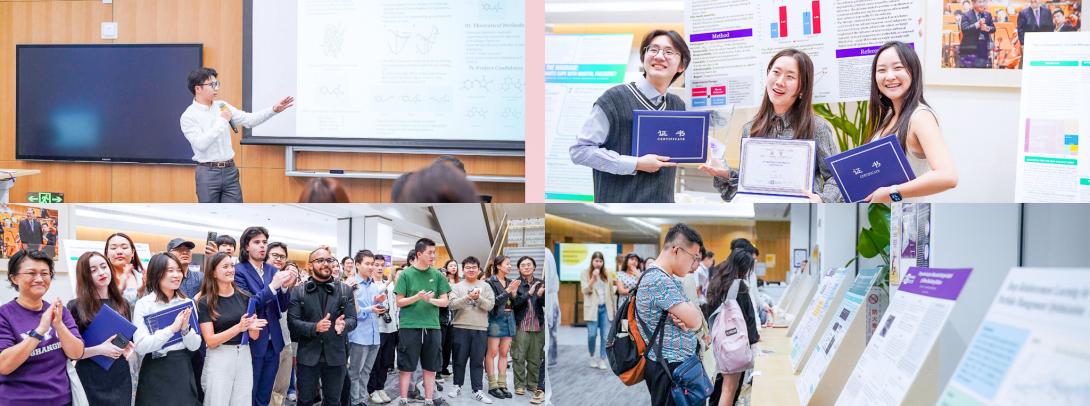NYU Shanghai undergraduates shared their work at the Fall 2023 Undergraduate Research Symposium on November 3. A record number of 35 groups of student researchers introduced their research to an audience of over 100 people on a diverse range of topics, everything from waste collection in India, Chinese painting, omission bias, and spotted lanternflies. Presentations covered a blend of Deans’ Undergraduate Research Fund (DURF) projects, Capstone projects, and individual research projects—all conducted under the guidance and support of faculty mentors. The students presented under two categories: Liberal Arts & Business and STEM.
Interim Dean of Computer Science, Data Science, and Engineering Nasir Memon, who presented the STEM awards, said he was greatly impressed. "Undergraduate research is an integral aspect of the NYU Shanghai experience,” he said. “It's important for our students to be curious, pursue knowledge, and experience the successes and failures that come with independent research. This endeavor supports their future social and personal development, regardless of whether they choose to pursue an academic career.”
Assistant Professor of Sociology Jia Miao, who served as one of the judges, said the symposium provides a great opportunity for students to showcase their research and communication skills and get necessary feedback from faculty judges and their peers. “Participation in the symposium paves the path to more rigorous research and the creation of new knowledge in the future.”
“It was great to meet many students who had one-on-one consultations with me this semester, and I knew they learned what reliable sources meant to the research,” said Reference and Research Services Librarian for Business Huang Yu, who attended the symposium. “I am constantly inspired by the diverse range of research topics explored by these talented students,” he said.
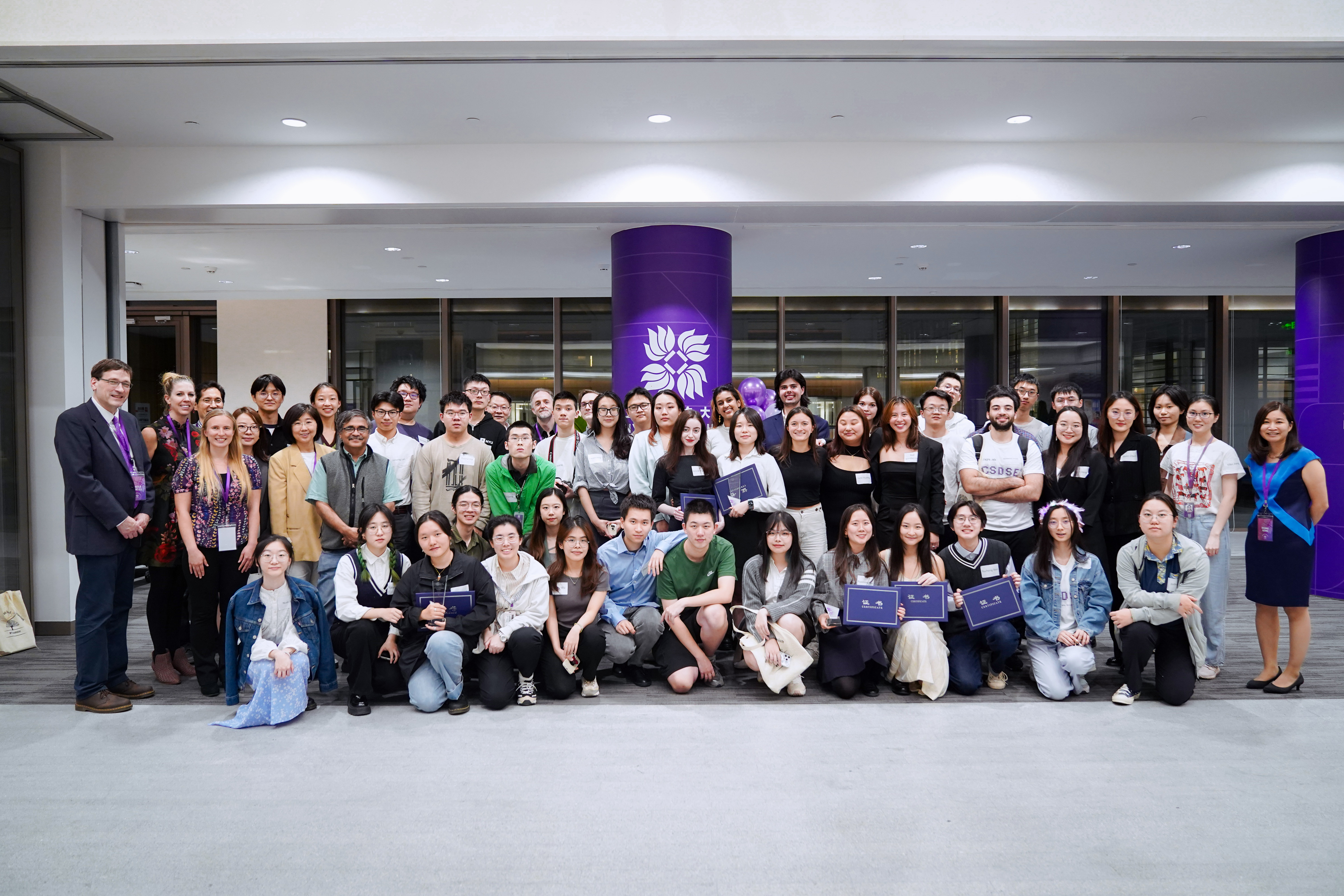 Here are the winners of the 2023 Fall Semester Undergraduate Research Symposium:
Here are the winners of the 2023 Fall Semester Undergraduate Research Symposium:
Liberal Arts & Business
Best Research Project
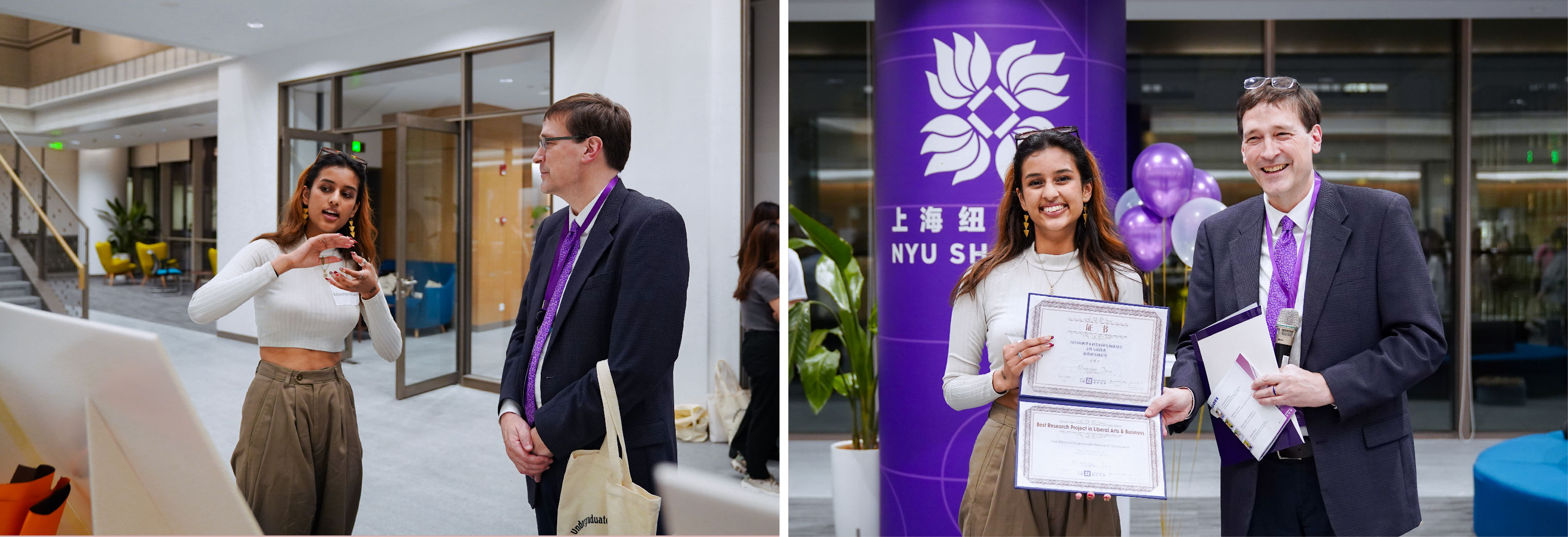
Title: Dirty Work in Jaipur: A Pilot Study on Waste Collection in Postcolonial Urban Communities
Researcher: Maanyaa Jain ’25 (Social Science and Humanities)
Discipline: Social Science
Mentor: Travis Klingberg
Why did you choose this research topic?
When I got the chance to research my hometown for my class project, I remember being incredibly excited and motivated to take it further than the scope of the classroom. Specifically, this project gave me a chance to learn about and articulate some of the stories I grew up hearing about my city that I couldn’t find in written records anywhere else. As such, the academic basis for writing on this topic was almost secondary, with my primary focus being an attempt at filling the gap in my knowledge on the topic as well as the literary landscape around postcoloniality.
What was it like working with your mentor?
Genuinely could not have asked for a better, more understanding mentor than Professor Klingberg. His class, Urban Political Ecology, initially got me thinking about my topic, and so it was very fulfilling to have him guide the process. What I appreciated the most was his topic-specific recommendations on readings and literature, as well as his tips on doing fieldwork that was highly specific to my inquiry. His understanding of the topic as well as the process of research and writing was instrumental in dealing with the logistical aspects of writing, which were often daunting and frankly illegible for me.
What unexpected challenges did you face along the way?
Because my work was literally quite close to home, it was often difficult for me to navigate the emotional and moral aspects of doing ethnographic fieldwork, and it was at times alienating. Professor Klingberg and some of my other professors this semester were very helpful in showing me how to recontextualize a lot of my work for academic purposes.
Any advice to future student researchers?
Pick a topic you care about so you are motivated to keep working on the project on top of everything else. I can’t overstate how important having a “bottom line” on who I hoped this project could help was to me when I felt demotivated or stagnant. Also, don’t be shy to talk to other professors or field experts about your project and research, even in fields outside of your topic, because having multiple perspectives can help you get out of a rut or open up avenues of research you hadn’t previously considered.
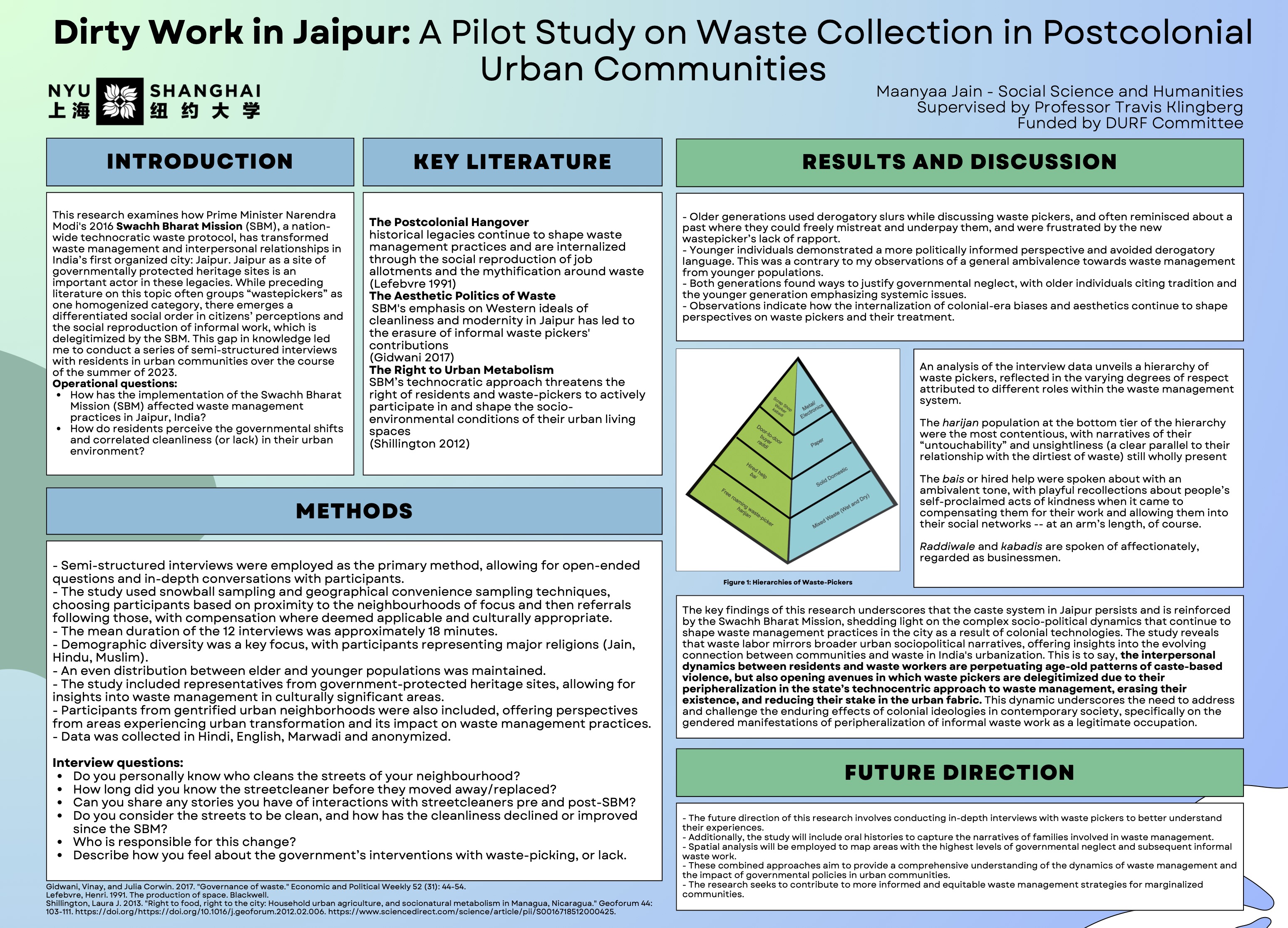
Project Abstract: Jain’s research investigates how Prime Minister Narendra Modi's 2016 Swachh Bharat Mission (SBM) altered the relationships between gully-residents, waste-pickers, and waste in Jaipur, India. Through
her research, in the form of interviews and literature review, she sought to understand what these changes reveal about the enduring power dynamics rooted in colonial history. The research positions waste labor as a microcosm of larger urban political and postcolonial narratives, offering insights into the evolving relationship between communities and waste in the context of India's urbanization.
Best Presentation
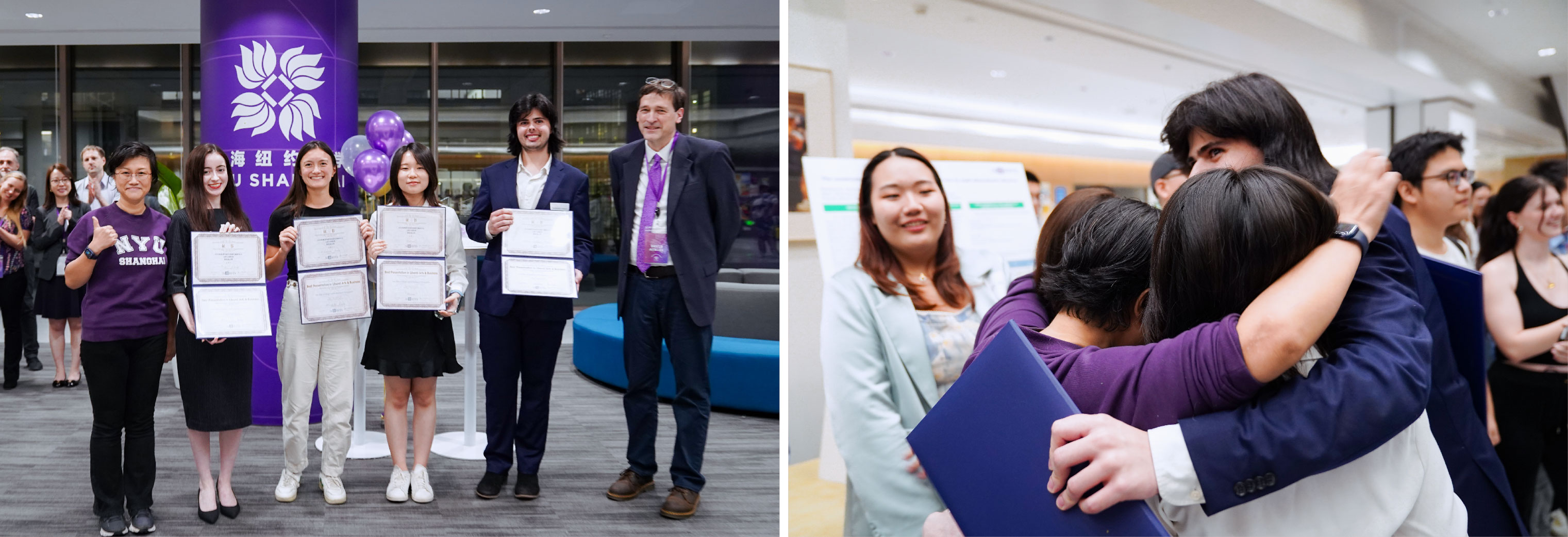
Title: Reviving Jiehua: China's Lost Painting Form
Researchers: Guilherme Cangiano Machado ’24 (Interactive Media and Business); Alicia Arango ’26 (Global China Studies); Lin Xuan ’26 (Global China Studies); Alexandra Kogler ’24 (Interactive Media and Business)
Discipline: Interdisciplinary
Mentor: Wen Shuang
Why did you choose this research topic?
Alicia Arango: I was first introduced to the art form jiehua (界画) by Professor Zuo Lala in her Chinese Architecture class. The art form intrigued me, and to my shock and surprise, I could not find anything in English on the topic, not even a basic article or Wikipedia entry. The only information existing was almost exclusively in Chinese. This phenomenon stuck in my mind, so when the opportunity came up later in a different class to do a long-form research project for Wikipedia, I immediately thought of jiehua and proposed the topic to my teammates. The rest was history.
What was it like working with your mentor?
It was truly such a joy to work with our mentor, Professor Wen Shuang. She was incredibly supportive throughout the entire process, and readily agreed to meet with us whenever we had questions and even helped us rehearse our presentations leading up to the Symposium. Her guidance on how to better improve our presentation, particularly body language and tips to scope out the venue ahead of time, as well as figure out the microphone situation, was the critical factor that we believe allowed us to walk away with Best Presentation at the Symposium.
What unexpected challenges did you face along the way?
The primary obstacle was the scarcity of English sources on our research topic, compounded by the fact that only two members of our team, Xuan Lin and myself, could read Chinese. This meant the two of us had to engage in extensive translation work and collect nearly all our primary and secondary resources to use for the entire team of four.
Any advice to future student researchers?
Our foremost piece of advice is to begin your research early – and we can't emphasize this enough. Start your research well in advance of your anticipated needs. You'll undoubtedly encounter challenges along the way, and having that extra time will prove invaluable for addressing any issues that may arise before your deadline. Rehearse, rehearse, rehearse! If you plan to participate in events like the Symposium that involve formal presentations, draft your script well in advance to allow ample time for memorization and rehearsal until it's flawless. Most crucially, be passionate about your project! If you lack enthusiasm for your research, it will reflect in your preparation and performance.

Project Abstract: Jiehua is a genre of Chinese painting that combines detailed architecture and shan shui landscapes, often adorned with the presence of figures, boats, and carts. Originating in the Western Zhou dynasty, it reached its zenith during the Song and Yuan periods, despite disdain from literati. The art form itself, together with its aesthetics and principles, disseminated to Japan and Korea, impacting the evolution of their art. Yet jiehua remains conspicuously neglected by English scholarship, with only two scholarly book publications and less than a dozen scholarly writings. This research establishes jiehua’s value for multidisciplinary research and its transnational impact.
STEM
Best Research Project
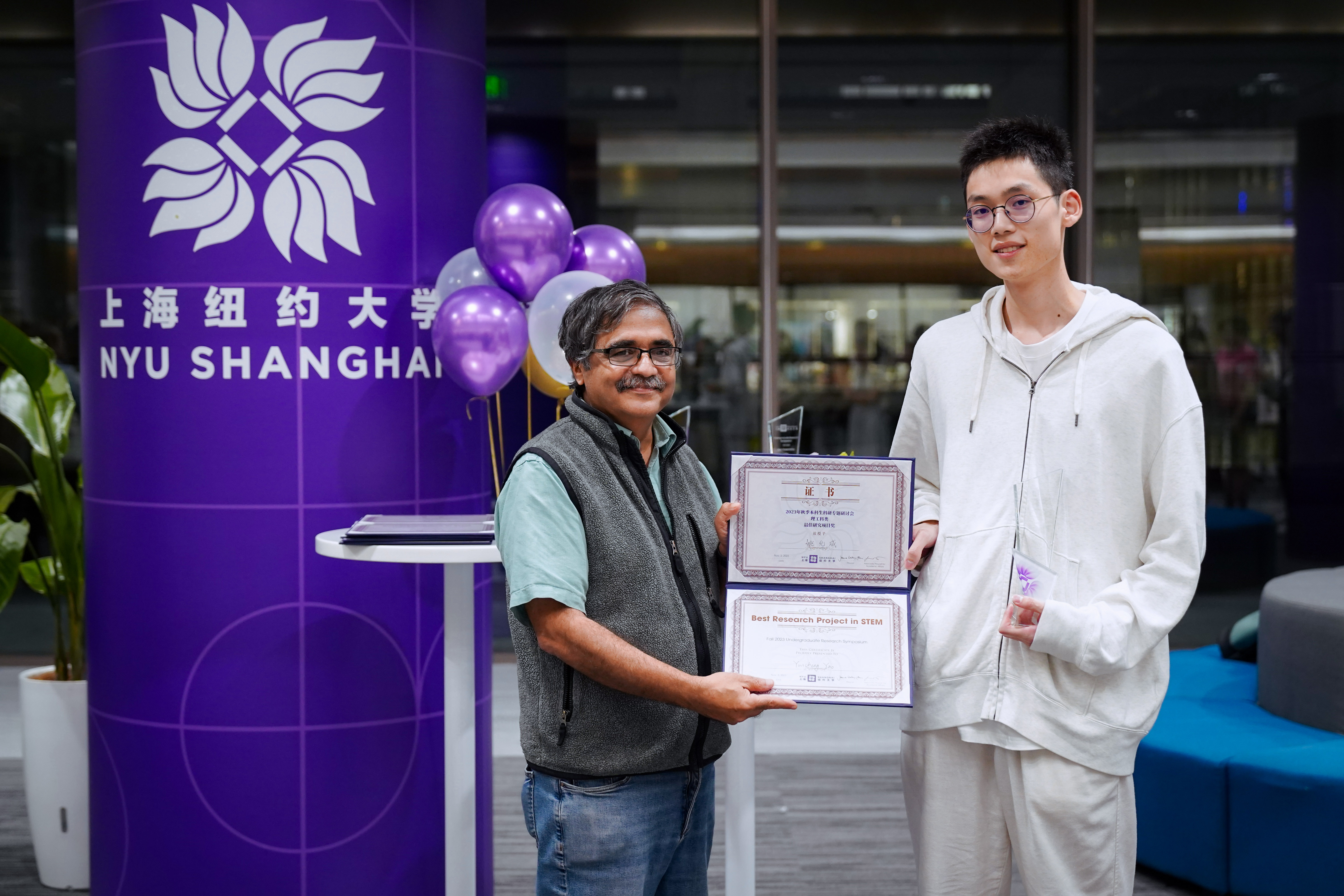
Title: MLFD: The Implementation and Performance Evaluation of an LSTM-based, SmartNIC-Offloadable Failure Detector
Researcher: Yao Yuncheng ’25 (Computer Science)
Discipline: Computer Science, Data Science, and Engineering
Mentor: Olivier Marin
Why did you choose this research topic?
I approached my mentor when I was taking his class and he recommended that SmartNIC could be a potential topic that is a hot topic in networking. Our school very luckily has state of the art hardware in terms of networking, and offers opportunities for students.
What was it like working with your mentor?
Very little pressure and a lot of fun. My mentor accepts negative results as a result. He is very supportive of my thoughts, and is insightful. He is very understanding of the fact that, during the process of proactively exploring a research question, there could be delays, stagnation, and unexpected results that challenge the original hypothesis.
What unexpected challenges did you face along the way?
All too often the question that you are investigating is so new that supporting material is limited, if [it] even exists. The biggest frustration could be the fact that you feel very alone during the journey, especially during the times when you are stuck with a question unanswered.
Any advice to future student researchers?
Communicating with the faculty mentor is very important and helpful because they have been through the process of finding research problems and generating novel ideas. Doing some small research, it could be painful, but the whole process is rewarding and nurturing in general.
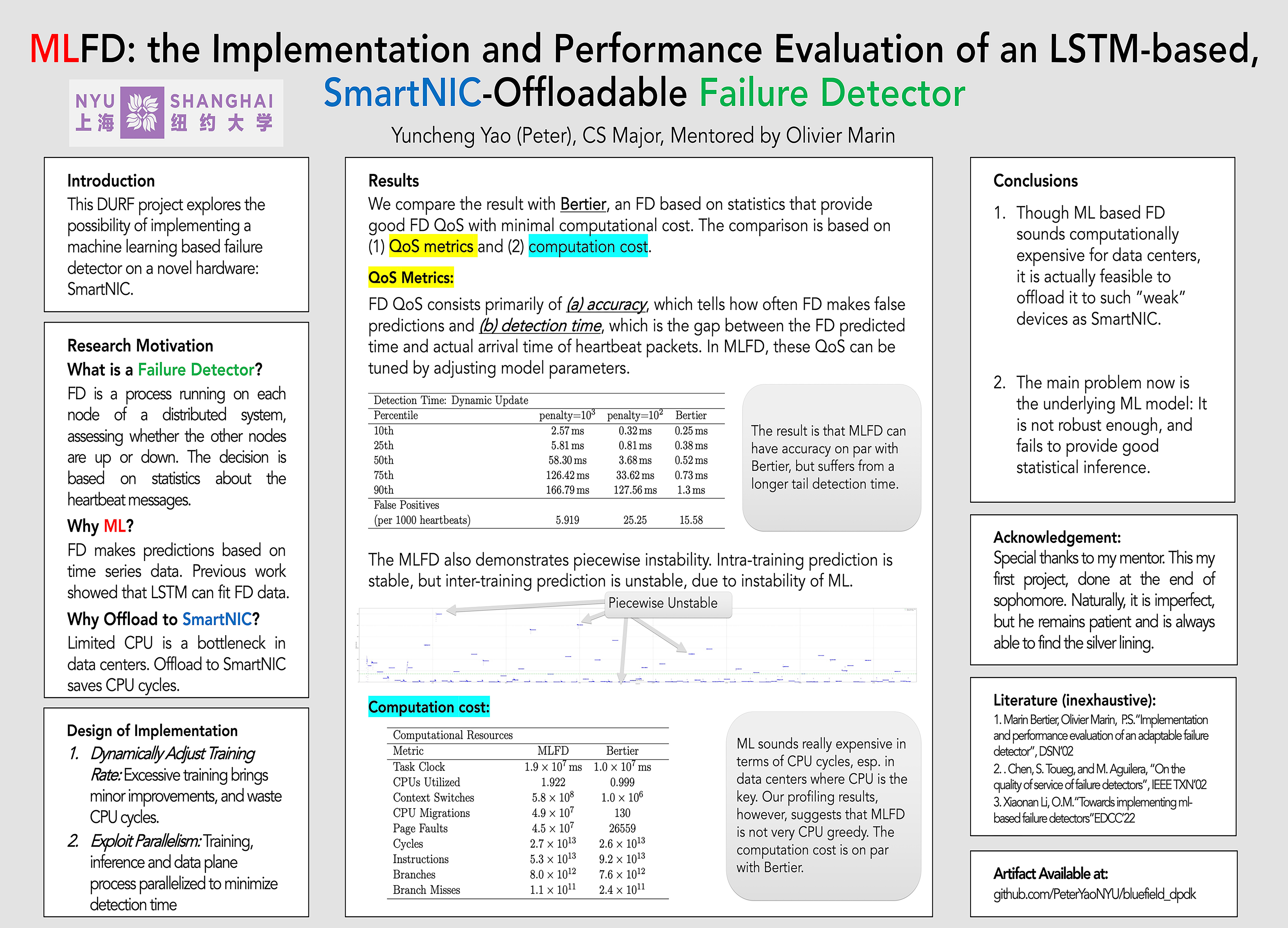
Project Abstract: This project explores the feasibility of using machine learning algorithms for failure detection services. Our implementation shows that a DPDK-based failure detector (FD) using long short-term neural network performs well in terms of accuracy, at the cost of reasonable additional computation resources for training and inference. We also show that our implementation can be offloaded to a mainstream SmartNIC - NVIDIA BlueField-2, while retaining comparable quality of service. The viability of offloading ML-FD to SmartNIC further frees up the concern that it will take up too much computation resources.
Best Presentation
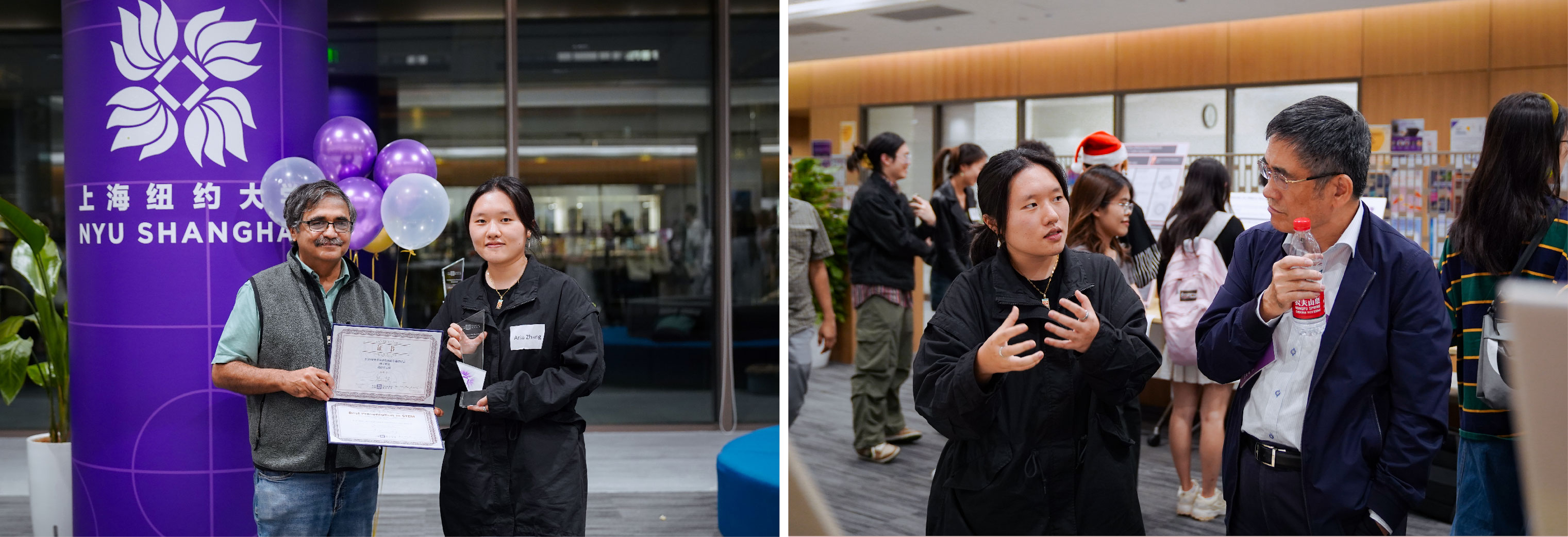
Title: Thermal Tolerance Adaptations of Spotted Lanternflies (SLFs) in New York City and Shanghai
Researcher: Aria Zhang ’24 (Biology)
Discipline: Biology
Mentor: Kristin Winchell
Why did you choose this research topic?
This species is an infamous invasive species in New York that I’ve seen in the Shanghai neighborhood where I was living when I was only a primary school kid. I discussed this with Dr. Winchell and said that I wanted to do some comparisons between the populations in New York and Shanghai, which happened to be their invasive and native range. We decided that the thermal physiology of this species may be interesting to investigate given that it can help us understand the spotted lanternfly as both an invasive species and a species that is adapting to urban environments.
What was it like working with your mentor?
I joined Dr. Winchell’s lab in October 2022 and learned a lot from weekly lab meetings as well as helping with others’ research projects. After I came back to Shanghai this May, we met through lab meetings and one-on-one meetings at midnight due to the time difference. She is always super supportive and helps me develop my research ideas every time I come up with something new. She also helped me develop practical skills such as using R and ArcGIS hand-by-hand during our meetings, which will benefit me profoundly in my future academic journey. Moreover, she cares about my mental health and always acknowledges my accomplishments, which helped me to build up my confidence. I’m so grateful to have the opportunity to join her lab and work under her supervision.
What unexpected challenges did you face along the way?
I guess unexpected challenges are just inevitable. My PI and I planned to sample each site only once and collect all the bugs which we would store in the lab for a 24-hour acclimation before thermal tolerance experiments. However, it turned out that the bugs couldn’t live well in the lab even with the tree sticks that they exclusively feed on. We eventually decided to sample only one group of bugs every time I went sampling in the morning and finished all the experiments for those samples when I got back to the lab on campus in the afternoon. It means that I had to spend my Monday, Wednesday, and Friday of September in the field sites and lab working with bugs, but I do think that the troubleshooting experience was valuable and fun.
Any advice to future student researchers?
Don’t be intimidated by the idea that you haven’t learned enough to conduct research. Start it first and you’ll learn more during the process.
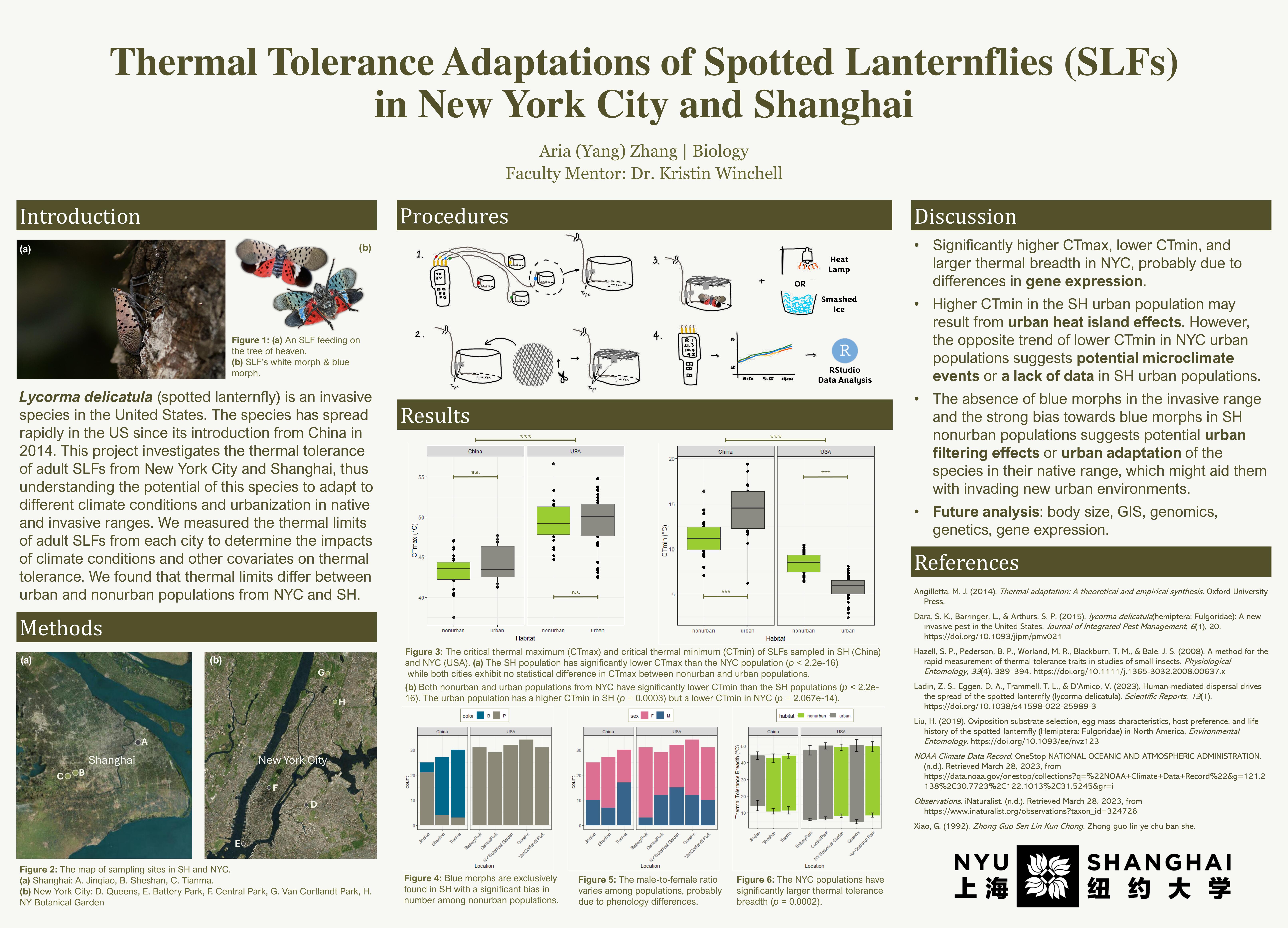
Project Abstract: Lycorma delicatula (spotted lanternfly) is an invasive species in the United States. The species has spread rapidly in the US since its introduction from China in 2014. This project investigates the thermal tolerance of adult spotted lanternflies from New York City and Shanghai, thus understanding the potential of this species to adapt to different climate conditions and urbanization in native and invasive ranges. We measured the thermal limits of adult spotted lanternflies from each city to determine the impacts of climate conditions and other covariates on thermal tolerance. We found that thermal limits differ between populations from NYC and Shanghai.
Most Popular Project
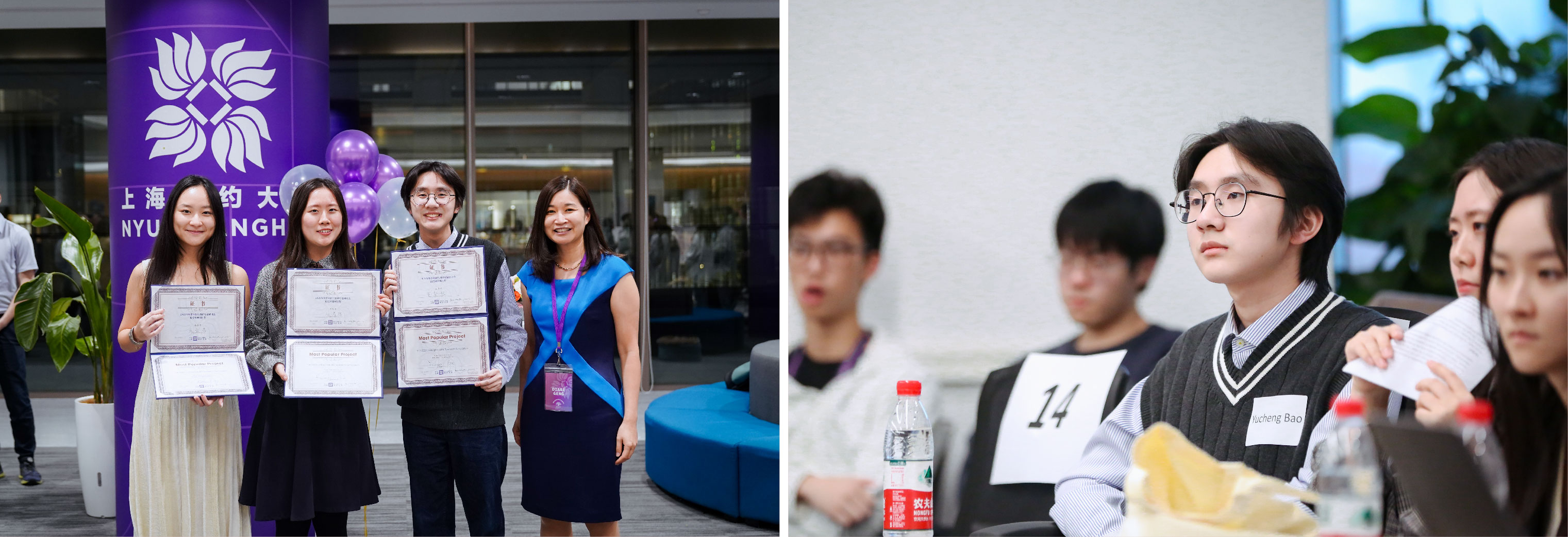
Title: The Omission Bias in the Chinese Context
Researcher: Bao Yucheng ’24 (Social Science); Sun Ruoming ’24 (Social Science & Data Science); Fang Yun-Hsin ’24 (Social Science & Math)
Discipline: Social Science
Mentor: Julia Hur
Why did you choose this research topic?
Sun Ruoming: Working in Professor Julia Hur's GIM (Goals, Incentives, & Meritocracy) lab has solidified my interest in social psychology, with a research focus on decision science. Unveiling the process of decision-making fascinates me as it offers insights into better informed choices. The concept of omission bias, which suggests that inaction is often seen as less culpable than action, sheds light on key facets of decision-making within critical fields like medical ethics, particularly regarding vaccinations, and financial decision-making in the stock market. Therefore, we were motivated to examine omission bias within the Chinese context, where research is scant, to understand how cultural influences shape judgment and decision making processes.
What was it like working with your mentor?
Since joining Professor Julia Hur's lab in June 2022, I have appreciated the immense support and encouragement from her, inspiring me to pursue academic research after graduation. She knows each lab members’ research interests very well and has granted us the opportunity to engage with projects that align with our individual research passions. Moreover, under her guidance, I've learned the meticulous and methodical nature of research. Her insistence on rigorously double-checking data analysis has been instrumental in the success of my independent research endeavors. For our research project on omission bias, her extensive support in research design and data interpretation has been invaluable. We are profoundly grateful for her mentorship. It was the first time for us to conduct an experimental design study, so we were unsure about many procedural practices in the beginning. Our faculty mentor helped us make the whole research flow clear.
Any advice to future student researchers?
We strongly advise prospective student researchers to begin their preparation early. This includes planning well in advance and submitting applications ahead of deadlines. Procrastination only exacerbates anxiety, so taking proactive steps is crucial. For those intending to conduct human subjects research and requiring Institutional Review Board (IRB) approval, we recommend initiating the application process as soon as possible. Simultaneously, maintain close communication with your advisor, and do not hesitate to seek clarification or guidance by asking any questions that arise.
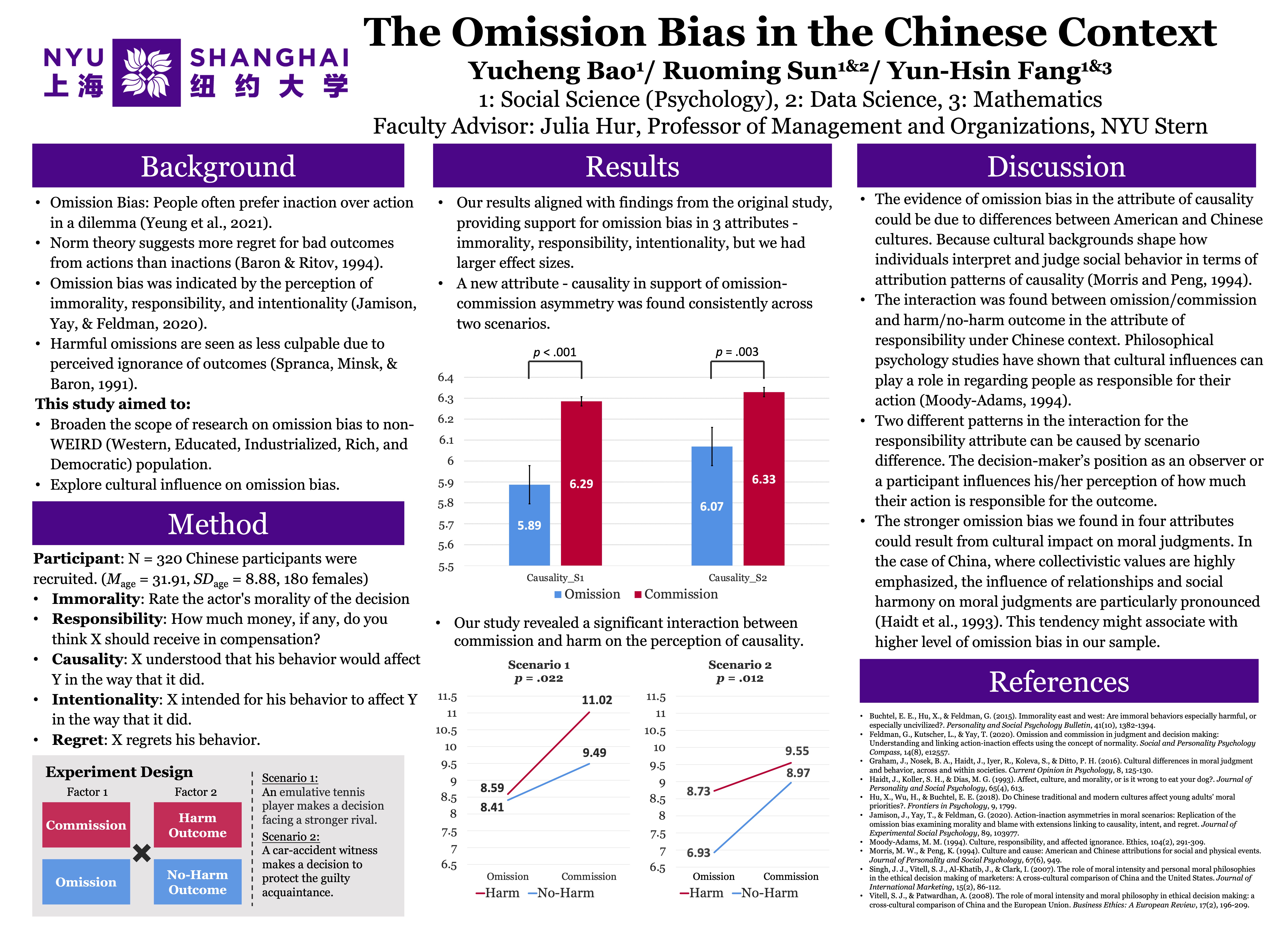
Project Abstract: Omission bias represents a type of decision-making bias, referring to the evaluation of commission as more blameworthy compared with omission. Most relevant research focuses on WEIRD (Western, Educated, Industrialized, Rich, and Democratic) countries. To extend the scope of research, we carried out a replication study based on Jamison, Yay, and Feldman (2020) among the Chinese population. While the original study only found omission-commission asymmetry in two attributes, our results provided stronger evidence for omission bias in four attributes - immorality, responsibility, causality, and intentionality. The attribute of responsibility in our study also revealed an interaction effect between commission and harm.
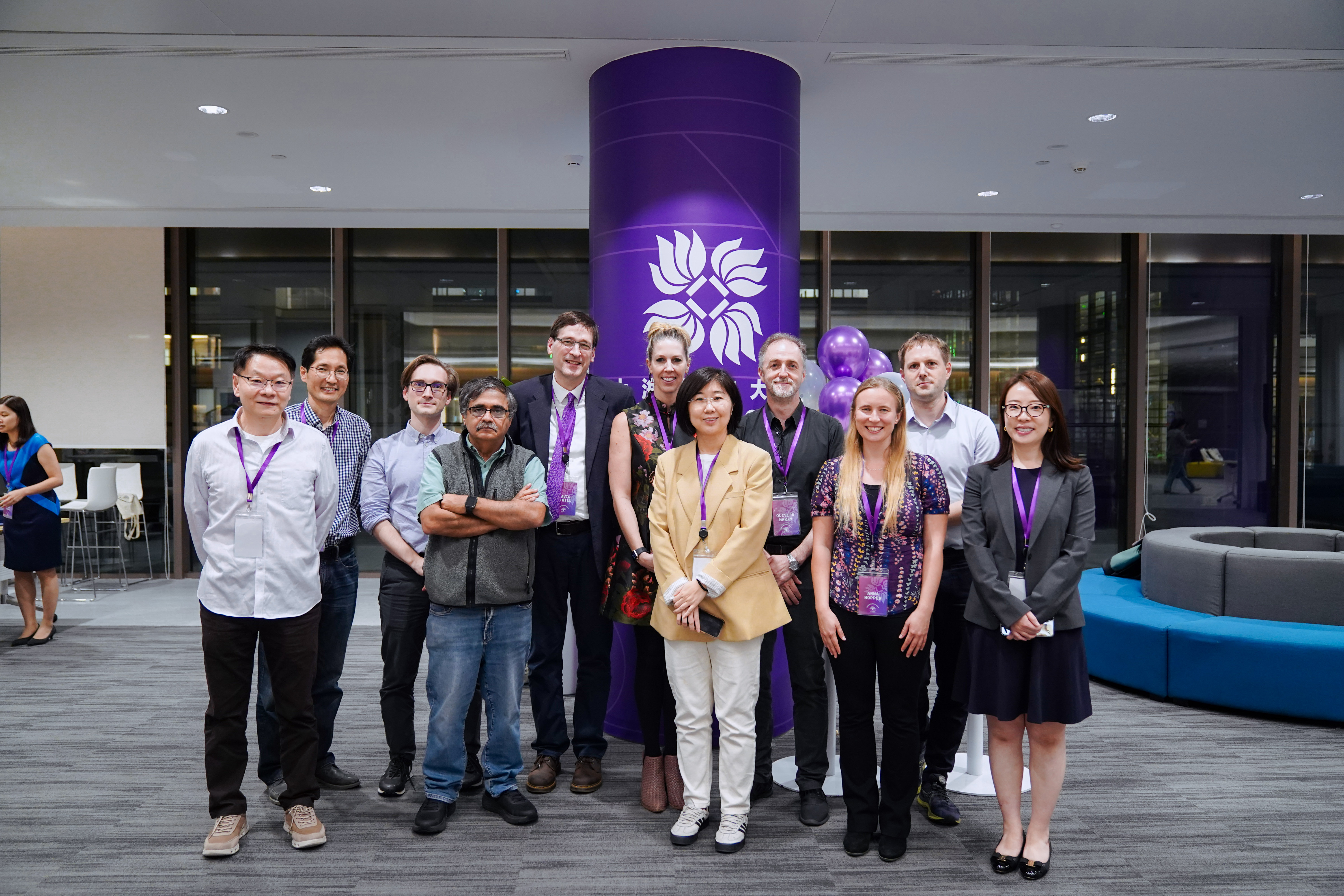
Faculty judges and award presenters (left to right): Henry James Li Xiaotao, Jungseog Kang, Mathieu Laurière, Nasir Memon, David Atwill, Melanie Hackney, Christina Wang Dan, Olivier Marin, Anna Hopper, Gottfried Haider, Jia Miao
Click for previous events: 2023 Spring, 2022 Fall


